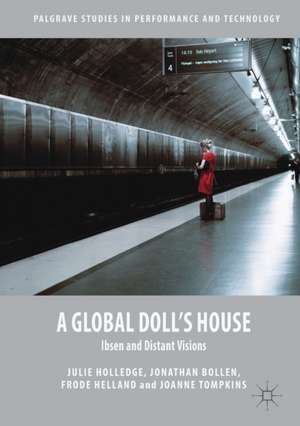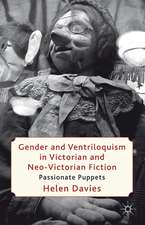A Global Doll's House: Ibsen and Distant Visions: Palgrave Studies in Performance and Technology
Autor Julie Holledge, Jonathan Bollen, Frode Helland, Joanne Tompkinsen Limba Engleză Paperback – 21 apr 2021
| Toate formatele și edițiile | Preț | Express |
|---|---|---|
| Paperback (1) | 572.43 lei 43-57 zile | |
| Palgrave Macmillan UK – 21 apr 2021 | 572.43 lei 43-57 zile | |
| Hardback (1) | 576.49 lei 43-57 zile | |
| Palgrave Macmillan UK – 17 oct 2016 | 576.49 lei 43-57 zile |
Preț: 572.43 lei
Preț vechi: 715.53 lei
-20% Nou
Puncte Express: 859
Preț estimativ în valută:
109.55€ • 113.80$ • 90.100£
109.55€ • 113.80$ • 90.100£
Carte tipărită la comandă
Livrare economică 03-17 februarie 25
Preluare comenzi: 021 569.72.76
Specificații
ISBN-13: 9781349683789
ISBN-10: 1349683787
Pagini: 233
Ilustrații: XIII, 233 p. 30 illus.
Dimensiuni: 148 x 210 mm
Greutate: 0.3 kg
Ediția:1st ed. 2016
Editura: Palgrave Macmillan UK
Colecția Palgrave Macmillan
Seria Palgrave Studies in Performance and Technology
Locul publicării:London, United Kingdom
ISBN-10: 1349683787
Pagini: 233
Ilustrații: XIII, 233 p. 30 illus.
Dimensiuni: 148 x 210 mm
Greutate: 0.3 kg
Ediția:1st ed. 2016
Editura: Palgrave Macmillan UK
Colecția Palgrave Macmillan
Seria Palgrave Studies in Performance and Technology
Locul publicării:London, United Kingdom
Cuprins
Introduction.- Part I. Cultural Transmission.- Chapter 1. Mapping the Early Noras.- Chapter 2. ‘Peddling’ Et dukkehjem.- Part II. Adaptation.- Chapter 3. Adaptation at a Distance.- Chapter 4. Ibsen’s Challenge.- Conclusion.- Bibliography.
Recenzii
“This book, using digital data analytics as a major methodological tool, opens an entirely new door to the Ibsen research of the future. The writing style is very concise and scientific, yet leaves space for playfulness and surprise. … The book includes not only rigorous scholarly narratives, but also visualized graphs, maps, and networks that allow us to understand patterns, structures, and models of Ibsen’s global success from a metaphorical bird’s-eye view.” (Antje Budde, Theatre Journal, Vol. 70 (2), June, 2018)
“A Global Doll's House provides a welcome consideration of how the varied forces of performance venues, financial and symbolic capital, and cultural constructions of motherhood and the female body around the world have acted as external constraints on the artistic diversity of performances and adaptations. … The book thus offers an innovative and thoughtful way to approach the production history of a single play using digitized records, and it will be very useful for future scholars working on similar projects.” (Dean Krouk, Modern Drama, Vol. 60 (04), 2017)
“A Global Doll’s House with its theoretical and analytical approach is an invaluable contribution to the field of Ibsen studies. While the book identifies the conventional explanations of the play’s global success, with a close examination of photographs, maps, graphs or networks, it incorporates new methods in Digital Humanities and a deeperinterrogation of digitised production records.” (Mariam Zarif, The British Society for Literature and Science, bsls.ac.uk, 2016)
Notă biografică
Led by Professor Julie Holledge (Centre for Ibsen Studies, University of Oslo), this collaborative project brings together Ibsen specialists with scholars in digital humanities and theatre studies: Dr Jonathan Bollen (University of New South Wales, Australia), Director of AusStage, the Australian database for researching performance (2006-13); Professor Frode Helland, (Director of the Centre for Ibsen Studies, University of Oslo, Norway), author of Ibsen in Practice (2015); and Professor Joanne Tompkins (University of Queensland, Australia), author of Theatre’s Heterotopias (2014), and co-author with Holledge of Women’s Intercultural Performance (2001), winner of the Rob Jordan Book Prize.
Textul de pe ultima copertă
'Anyone engaged in the critical evaluation of individual productions of A Doll House would do well to consult this groundbreaking presentation of an international baseline of performance interpretation, one based in a cumulative historical practice that up to this point has eluded scholarly analysis due to the inherent limitations of existing methods.' - Mark Sandberg, Professor of Film & Media and Scandinavian Studies, University of California, Berkeley, USA
'Digital humanities meet Ibsen, revealing astonishing patterns and amazing diversity. This first global history of one of the world’s most famous plays is a landmark contribution to Ibsen scholarship, performance history and cultural studies.' - Narve Fulsås, Professor of Modern History, University of Tromsø, Norway
'A very fine example of the new field of digital humanities, A Global Doll's House is a model exploration of the possibilities which new technologies offer, using them to provide precise and incisive answers to formerly unsolvable questions. It is, in fact, an important contribution to Ibsen Studies.' – Erika Fischer- Lichte, Professor of Theatre Studies, Freie Universität Berlin, Germany
This book addresses a deceptively simple question: what accounts for the global success of A Doll’s House, Henrik Ibsen’s most popular play? Using maps, networks, and images to explore the world history of the play’s production, this question is considered from two angles: cultural transmission and adaptation. Analysing the play’s transmission reveals the social, economic, and political forces that have secured its place in the canon of world drama; a comparative study of the play’s 135-year production history across five continents offers new insights into theatrical adaptation. Key areas of research include the global tours of nineteenth-century actress-managers, Norway’s soft diplomacy in promoting gender equality, representations of the female performing body, and the sexual vectors of social change in theatre.
'Digital humanities meet Ibsen, revealing astonishing patterns and amazing diversity. This first global history of one of the world’s most famous plays is a landmark contribution to Ibsen scholarship, performance history and cultural studies.' - Narve Fulsås, Professor of Modern History, University of Tromsø, Norway
'A very fine example of the new field of digital humanities, A Global Doll's House is a model exploration of the possibilities which new technologies offer, using them to provide precise and incisive answers to formerly unsolvable questions. It is, in fact, an important contribution to Ibsen Studies.' – Erika Fischer- Lichte, Professor of Theatre Studies, Freie Universität Berlin, Germany
This book addresses a deceptively simple question: what accounts for the global success of A Doll’s House, Henrik Ibsen’s most popular play? Using maps, networks, and images to explore the world history of the play’s production, this question is considered from two angles: cultural transmission and adaptation. Analysing the play’s transmission reveals the social, economic, and political forces that have secured its place in the canon of world drama; a comparative study of the play’s 135-year production history across five continents offers new insights into theatrical adaptation. Key areas of research include the global tours of nineteenth-century actress-managers, Norway’s soft diplomacy in promoting gender equality, representations of the female performing body, and the sexual vectors of social change in theatre.
Caracteristici
Offers a ground-breaking new approach to Ibsen’s most iconic works Draws on digital humanities to offer a fresh new perspective on Ibsen’s most popular play Includes detailed visualisations of key concepts, using the newest approaches in digital humanities































